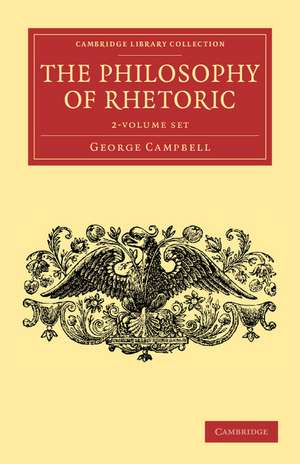The Philosophy of Rhetoric 2 Volume Set: Cambridge Library Collection - Philosophy
Autor George Campbellen Limba Engleză Quantity pack – 30 oct 2013
Din seria Cambridge Library Collection - Philosophy
-
 Preț: 423.32 lei
Preț: 423.32 lei -
 Preț: 526.84 lei
Preț: 526.84 lei -
 Preț: 424.07 lei
Preț: 424.07 lei -
 Preț: 331.89 lei
Preț: 331.89 lei -
 Preț: 280.17 lei
Preț: 280.17 lei - 19%
 Preț: 471.35 lei
Preț: 471.35 lei -
 Preț: 536.47 lei
Preț: 536.47 lei -
 Preț: 268.66 lei
Preț: 268.66 lei -
 Preț: 366.37 lei
Preț: 366.37 lei -
 Preț: 520.03 lei
Preț: 520.03 lei -
 Preț: 371.36 lei
Preț: 371.36 lei -
 Preț: 249.27 lei
Preț: 249.27 lei -
 Preț: 280.72 lei
Preț: 280.72 lei -
 Preț: 529.56 lei
Preț: 529.56 lei -
 Preț: 248.07 lei
Preț: 248.07 lei -
 Preț: 337.76 lei
Preț: 337.76 lei -
 Preț: 337.94 lei
Preț: 337.94 lei -
 Preț: 519.45 lei
Preț: 519.45 lei -
 Preț: 423.70 lei
Preț: 423.70 lei -
 Preț: 332.48 lei
Preț: 332.48 lei -
 Preț: 424.07 lei
Preț: 424.07 lei -
 Preț: 528.96 lei
Preț: 528.96 lei -
 Preț: 431.31 lei
Preț: 431.31 lei -
 Preț: 278.99 lei
Preț: 278.99 lei -
 Preț: 330.16 lei
Preț: 330.16 lei - 19%
 Preț: 635.30 lei
Preț: 635.30 lei -
 Preț: 236.27 lei
Preț: 236.27 lei -
 Preț: 368.30 lei
Preț: 368.30 lei -
 Preț: 249.27 lei
Preț: 249.27 lei -
 Preț: 330.93 lei
Preț: 330.93 lei -
 Preț: 371.20 lei
Preț: 371.20 lei -
 Preț: 331.89 lei
Preț: 331.89 lei -
 Preț: 421.42 lei
Preț: 421.42 lei -
 Preț: 236.05 lei
Preț: 236.05 lei
Preț: 398.18 lei
Preț vechi: 522.22 lei
-24% Nou
Puncte Express: 597
Preț estimativ în valută:
76.20€ • 79.10$ • 63.54£
76.20€ • 79.10$ • 63.54£
Carte indisponibilă temporar
Doresc să fiu notificat când acest titlu va fi disponibil:
Se trimite...
Preluare comenzi: 021 569.72.76
Specificații
ISBN-13: 9781108064385
ISBN-10: 1108064388
Pagini: 992
Dimensiuni: 140 x 225 x 60 mm
Greutate: 1.15 kg
Editura: Cambridge University Press
Colecția Cambridge University Press
Seria Cambridge Library Collection - Philosophy
Locul publicării:Cambridge, United Kingdom
ISBN-10: 1108064388
Pagini: 992
Dimensiuni: 140 x 225 x 60 mm
Greutate: 1.15 kg
Editura: Cambridge University Press
Colecția Cambridge University Press
Seria Cambridge Library Collection - Philosophy
Locul publicării:Cambridge, United Kingdom
Cuprins
Volume
1:
Preface;
Introduction;
Part
I.
The
Nature
and
Foundations
of
Eloquence:
1.
Eloquence
in
the
largest
acceptation
defined;
2.
Of
wit,
humour,
and
ridicule;
3.
The
doctrine
of
the
preceding
chapter
defended;
4.
Of
the
relation
which
eloquence
bears
to
logic
and
to
grammar;
5.
Of
the
different
sources
of
evidence,
and
the
different
subjects
to
which
they
are
respectively
adapted;
6.
Of
the
nature
and
use
of
the
scholastic
art
of
syllogising;
7.
Of
the
consideration
which
the
speaker
ought
to
have
of
the
hearers
as
men
in
general;
8.
Of
the
consideration
which
the
speaker
ought
to
have
of
the
hearers
as
men
in
particular;
9.
Of
the
consideration
which
the
speaker
ought
to
have
of
himself;
10.
The
different
kinds
of
public
speaking
in
use
among
the
moderns,
compared,
with
a
view
to
their
different
advantages
in
respect
of
eloquence;
11.
Of
the
cause
of
that
pleasure
which
we
receive
from
objects
or
representations
that
excite
pity
and
other
painful
feelings;
Part
II.
The
Foundations
and
Essential
Properties
of
Elocution:
1.
The
nature
and
characters
of
the
use
which
gives
law
to
languages;
2.
The
nature
and
use
of
verbal
criticism,
with
its
principal
canons;
3.
Of
grammatical
purity;
4.
Some
grammatical
doubts
in
regard
to
English
construction
stated
and
examined.
Volume
2:
5.
Of
the
qualities
of
style
strictly
rhetorical;
6.
Of
perspicuity;
7.
What
is
the
cause
that
nonsense
so
often
escapes
being
detected,
both
by
the
writer
and
by
the
reader;
8.
The
extensive
usefulness
of
perspicuity;
9.
May
there
not
be
an
excess
of
perspicuity?;
Part
III.
The
Discriminating
Properties
of
Elocution:
1.
Of
vivacity
as
depending
on
the
choice
of
words;
2.
Of
vivacity
as
depending
on
the
number
of
the
words;
3.
Of
vivacity
as
depending
on
the
arrangement
of
the
words;
4.
Of
the
connectives
employed
in
combining
the
parts
of
a
sentence;
5.
Of
the
connectives
employed
in
combining
the
sentences
in
a
discourse.
Descriere
Published
in
1776,
this
is
a
classic
two-volume
work
on
rhetorical
theory
by
a
leading
figure
of
the
Scottish
Enlightenment.
